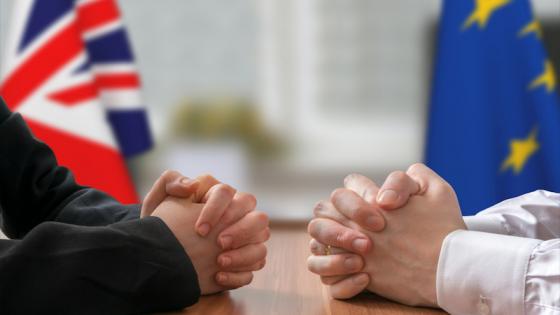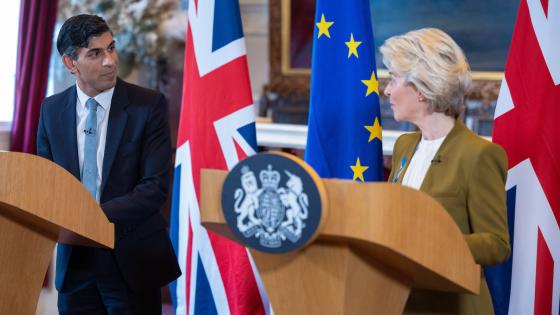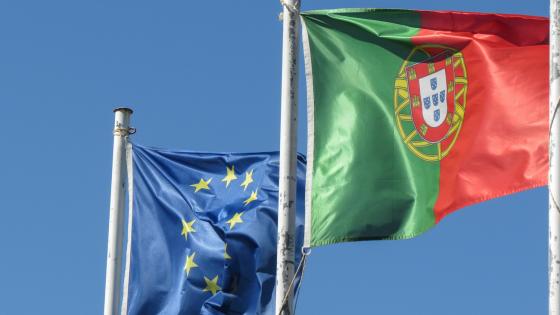The Brexit negotiations are not going well and Brexit continues to be a major source of uncertainty for the British economy (Bloom and Mizen 2017). This is to a large extent because the British side apparently lacks a coherent plan of what it would like to achieve (May 2017). Perhaps this is not too surprising, given the difficulty of reading the result of the June 2016 referendum (Baldwin 2016). However, there is also a major problem on the European side. The negotiations are based on a premise which is fundamentally flawed, namely that the four freedoms of the EU’s single market – freedom of goods, capital, services, and labour – are indivisible. Representatives of the EU have frequently repeated the indivisibility claim (e.g. Barnier 2017) and that there can be no cherry picking among the four freedoms. Yet the indivisibility claim has no economic foundations. It is, in fact, a dogma. Economic theory not only defies the indivisibly claim, it suggests that the four freedoms can be substitutes.
Why the indivisibility dogma defies logic
This holds true in particular for trade and migration. To see this, you only need to recognise that goods crossing borders embody the services of productive factors, such as labour. The labour inflow embodied in a country’s imports has much the same effect on wages as a direct labour inflow (immigration), and this holds analogously for the labour outflow embodied in a country’s exports. Thus, trade amounts to a movement of labour without any movement of people. The more restricted migration between two countries, the more important unrestricted trade between them. The indivisibility dogma defies this logic, put forward as early as 1933 by Ohlin. In doing so, it is causing harm on both sides of the Channel. As an aside, we note that there is a strong case for tying the freedom of people to membership of a currency area (Mundell 1961), but, alas, Britain never joined the Eurozone.
Many people will retort that the logic of trade and migration as substitutes has limited empirical validity. Empirically, trade and migration are often complements rather than substitutes. Trade caused by non-Ohlinian forces may create migration incentives rather than reducing them (Markusen 1983). The presence of foreign-born residents makes trade with foreign countries easier and less costly (Rauch and Trindade 2002, Combes et al. 2005, Felbermayr and Jung 2009). And exports of goods are often tied to (supporting) services, which may require (at least temporary) cross-border movement of people (Francois and Hoekman 2010, De Grauwe 2016). Therefore, by restricting migration the UK also impedes trade, thus hurting itself and the EU27. Very sad, indeed, but hardly a reason to inflict further damage on both sides by reintroducing trade barriers through a hard Brexit.
Why is the EU insisting on indivisibility?
This is all well understood. Why, then, is the EU so ready to do harm by adhering to indivisibility in the Brexit negotiations? There are at least two answers. The first follows the simple logic of winners and losers. Given that migration barriers are an unavoidable consequence of the June 2016 referendum, would anybody be better off under a hard Brexit, as implied by the indivisibility dogma, than under in a soft Brexit whereby Britain and the EU mutually keep the first two movements (goods and services), even if the fourth (labour) is lost? The answer, of course, is yes. Just as any trade liberalisation has winners and losers, so will the opposite scenario where barriers are reintroduced for trade between the UK and the EU. But there is a crucial difference: while trade liberalisation generates net gains for the economies at large, reintroducing barriers would generate net losses on both sides of the Channel.1
But why should the (minority) winners rather than the (majority) losers prevail from a hard Brexit? It is often argued that trade liberalisation is hard to achieve since winners are a more dispersed lot with relatively little weight in governments’ objective functions, relative to the concentrated special interests which might be hurt by liberalisation. In the present context, this same distributional asymmetry between losers and winners works in favour of a hard Brexit. Examples for winners are not hard to come by. Think of the regions hoping to benefit from (purported or factual) relocation strategies of firms presently headquartered in London. Moreover, while reintroducing most-favoured nation (MFN) tariffs between the UK and the EU27 would make life harder for German firms in the UK, EU tariffs on UK products may be a welcome protection for these same firms on EU27 markets.2
The second explanation invokes the usefulness, if not necessity, of policy rules. It argues that the EU is all about rules, and rules must be adhered to, no matter what. Generally, the usefulness of a policy rule cannot be judged only from the outcome of adhering to it in any one instance. Indeed, accepting harm in applying a rule is a powerful way to make it credible. If it is a good rule, then it delivers a greater good that compensates for the damage done in any one instance of application. Yet, even if the greater good as such is established and unquestioned, surely the policymaker’s determination to adhere to the rule should also depend on the specific circumstances given at the time (Drazen and Masson 1994).
But what, exactly, is the greater good delivered by indivisibility of the single market freedoms? Certainly, the static view of gains from trade and migration that we have alluded to above fails in identifying such a greater good. Might a dynamic view of the process of gainful integration be more successful? Perhaps in analogy to the argument for preferential (discriminatory) trade liberalisation as a stepping stone towards free trade, which might be more difficult or impossible to achieve going the multilateral route (Grossman 2016)? We do not want to rule out that a rationale for indivisibility can be found along such lines, but we do not see it anywhere in the arguments put forward in favour of indivisibility since Brexit came up as a real issue. Barring any such rationale, indivisibility does not qualify as a rule, but it is – well – a dogma. Ask the Vatican for further details.
Some qualifications
We should like to add two qualifications. First, questioning the indivisibility dogma does not imply opening up European integration to cherry picking. An orderly Brexit that saves free trade in goods and services (inasmuch as these do not require presence of the service provider, i.e. modes 1 and 2 of the GATS) is a far cry from formally establishing an EU featuring integration à la carte. Surely, a soft Brexit does not imply that the EU must offer its present or future members a menu of freedoms to choose from. Membership could still be defined as adhering to all four freedoms.
But wouldn’t some countries want to follow Britain’s example if soft exits are permitted? Suppose that a soft Brexit does lead to further exit activity, fuelled by frustration about the freedom of labour. Then, there are two options (at least as far as countries which haven’t joined the Eurozone are concerned): compromising on this freedom, or accepting exits and a smaller union. Both are regrettable, but the latter should not be all that shocking. After all, there is Article 50 of the Treaty, which is regrettably unspecific when it comes to the details. The indivisibility dogma offers a temptingly simple way out: we only need to make exit a sufficiently horrifying scenario for even the least enthusiastic member to be deterred. But this strategy itself is horrifying. Harmonious and consensual integration requires that we seek an adjustment margin other than the fear of the exit aftermath. Sometimes, retreat is the only way to avoid defeat.
And second, questioning the indivisibility dogma does not imply that the freedom of labour is of secondary importance and may be discarded at no cost. The theory of migration tells us that a country may expect significant gains from immigration if it can cope with its distributional effects (Borjas 1999, 2014). Yet, all governments are finding it hard to communicate these gains to their voters, even those who make a serious effort. The UK is unique only in that this common problem has – by accident more than by intent – led to it breaking away from the EU. Negotiators on both sides are now forced to wade into unpleasant and unchartered territory. In this situation, having a euphonious principle to adhere to is all too enticing – at least for a while until one realises that it’s a flawed dogma.
References
Baldwin, R E (ed) (2016), Brexit Beckons: Thinking ahead by leading economists, VoxEU.org eBook.
Barnier, M (2017), "Protecting citizens' rights in the negotiations with the UK", Speech at the 7th State of the Union Conference, European University Institute, Florence, 5 May.
Bloom, N and P Mizen (2017), “New survey evidence on the impact of Brexit on UK firms”, VoxEU, 5 October.
Borjas, G J (1999), “The economic analysis of immigration”, Ch 28 in O Ashenfelter and D Card (eds), Handbook of Labor Economics 3A, Amsterdam: Elsevier Science BV.
Borjas, G J (2014), Immigration Economics, Harvard University Press.
Combes, P-P, M Lafourcade and T Mayer (2005), “The trade-creating effects of business and social networks: Evidence from France”, Journal of International Economics 66(1): 1–29.
De Grauwe, P (2016), “How to prevent Brexit from damaging the EU”, in R E Baldwin (ed), Brexit Beckons: Thinking ahead by leading economists, VoxEU.org eBook.
Drazen, A and P R Masson (1994), “Credibility of policies versus credibility of policymakers”, Quarterly Journal of Economics 109(3): 735–754.
Felbermayr, G J and B Jung (2009), “The pro-trade effect of the brain drain: sorting out confounding factors”, Economics Letters 104(2): 72–75.
Francois, J and B Hoekman (2010), “Services trade and policy”, Journal of Economic Literature 48: 642–692.
Grossman, G M (2016), “The purpose of trade agreements”, Ch 7 in K Bagwell and R W Staiger (eds), Handbook of Commercial Policy vol 1A, Elsevier.
Markusen, J R (1983), “Factor movements and commodity trade as complements”, Journal of International Economics 14(3–4): 341–356.
May, T (2017), "A new era of cooperation and partnership between the UK and the EU", Speech in Florence, 22 September.
Mundell, R A (1961), “A theory of optimum currency areas”, American Economic Review 51(4): 657–665.
Ohlin, B (1933), Interregional and international trade, Harvard University Press.
Rauch, J E and V Trindade (2002), “Ethnic Chinese networks in international trade”, Review of Economics and Statistics 84(1): 116–130.
Sampson, T (2017), “Brexit: The economics of international disintegration”, Journal of Economic Perspectives 31(4): 163–184.
Endnotes
[1] This assumes, realistically, that the EU will be reluctant to accept anything close to a single market for goods in a special trade agreement with the UK, referring to the indivisibility of the four freedoms and to the UK’s unwillingness to accept free movement of labor; for a discussion of possible arrangements other than maintaining single market status, see Sampson (2017).
[2] Lest we are misunderstood, we don’t claim to see active lobbying of these interests in Brussels. But one is left wondering why the voice of German industry (BDI) should come forward explicitly backing the Commission’s strategy based on the indivisibility dogma, while at the same time stressing that a hard Brexit would cause havoc in UK-German trade. For the latter, see here; for BDI support of a hard Brexit, see here (in German).



